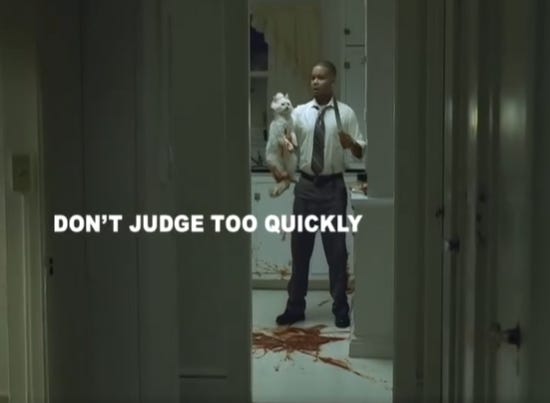Language As A Tool For Thinking
A weekly dose of motivation, inspiration and education from Masha and Jedrek.
Ahoy Sailors!
Hi folks, it’s your Polish captain again. This week I am writing about subverting the culture in which we live, Maciek is here with an icebreaker, Agata - quite exceptionally - has a video for you, Ela is back with another great book from her bookshelf. No song of the week from Mateusz regretatably, but he’s on holidays in the United States. Check out his instagram, by the way, if you haven’t yet, the pictures he publishes from Arizona, Nevada and California are just mind-blowing. A little less impressive but still good is the picture of a strange mountain near to where I live in My France section. Check it out and let’s roll!
Language As A Tool For Thinking
By Jedrek Stepien
Don’t fight with the trend – says the first principle of a successful investor. The same is with culture. If it is changing, and it is not to your liking, there is very little you can do. Take the dropping rates of fertility for example. Governments all over the world are trying to reverse the trend, but most of their efforts are in vain because having more children is no longer culturally validated. The same is with the media. If you feel like we’re on a slippery slope and the dumb content of yesterday seems like a high-brow entertainment today, it’s largely due to cultural changes inspired by mass society, rampant technological progress, and turbo capitalism. This culture, born after the Second World War, can best be summarized as one of making things easy. Everything must be made easy these days, from mopping the floor to dating. If you don’t know how to do something, there’s an app for it. I don’t have to tell you that with the development of AI the trend had gained an additional jet engine or two. We may regard it as a blessing or a curse, but one thing is for certain: there’s very little we can do to change it, so the old schoolers either learn to swim, or they sink.
For an older soul like mine, one of the unfortunate consequences of the current culture is the disappearance of thinking and reflection. They had to go because they were difficult. Deep reading and focus, development of one’s own opinions, plus the taking of responsibility for one’s words are so culturally alien to our times that they had to be replaced with some ersatz. I think it happened by flooding us with information. We have never been better informed as a society, but at the same time we have never had such little time to process the information that reaches our brains. As a result, we are skimming information in a thoughtless drift and almost instantly forget what we read because there is always more and more to read. I know some opportunists like big tech companies, political parties or various activists thrive on it, but I would much better see this trend reversed. Knowing, however, you don’t fight with the trend, I tried at least to subvert it.
I told you last time how driven by the very spirit of making things easy I was trying to find the shortcut to wisdom. I think I failed on my quest, but I may have discovered something of greater value still. As you may remember, I was using language to access wisdom. I may never have succeeded, but the tool I designed is still worth something.
Language - I always say that - is smarter than us, its users. It is a huge store of concepts inherited from the generations that came before us. Each concept exists for a reason because people who coined it saw a different shade of meaning in the world and decided to capture it and give it a name. We use them mostly unreflexively, especially when we speak our first language, but things look different, I noticed, when we use a second language. There, even familiar concepts aren't taken for granted. And this turns out to be a powerful tool for thinking.
By reflecting on single concepts, comparing and contrasting their pairs, and investigating why language chooses one collocation over the other we can raise above our current state of knowledge and intuitively understand new phenomena without needing new information. Words work in this case like prices in the world of investing. You may try and read all the news coming from the markets, but this will likely add to your confusion. Observing the price action, on the other hand, can give you a much clearer view of the situation. Thanks to language, we can consolidate the excess of information in our heads. Do they cook in McDonalds? Is making a sandwich even cooking? What about Cesar's salad? When does preparing food stop and cooking start? What is the difference between a box and a cage? Why do we have loyalty cards rather than faithfulness ones? Etc.
Is it difficult? Yes, it is bloody difficult, like every creative work, but the whole process is assuaged by the fact that you are learning a second language, so the stake is relatively low, and the hardest job of observing, finding good examples, illustrating, and connecting the dots is hidden away from the dumbing roller of our current culture. This is how we can subvert the culture of making things easy - by making thinking easier. And all you need for this is just language.
THIS WEEK IN ToL:
Thinking Out Loud 093: People, Systems And Rules With Agata
I am so happy that Agata, the very same who writes for us in this newsletter, agreed to come on the show. We have had one of the messiest episodes in terms of form, but the content is one of the best in my personal opinion. We managed to record a 100% spontaneous conversation in which all three of us contributed almost equally. What did we talk about? Everything from shooting Germans in Classified: France ‘44 (a computer game) to working at the ariport and whether people can humanize the soulless system. There was reflection, there was depth, and a lot of laughter too.
THE PHRASE OF THE WEEK
By Maciek Skulski
Icebreaker
Two years ago, I was at an international business meeting in the Netherlands. We all worked for the same company but came from different countries and had never met before. When the meeting started, the organizers showed us the agenda, and one of the points was an “icebreaker”. At first, I was a bit confused. It was hot outside, and I thought, “An icebreaker? But it’s warm here, what ice are they talking about?”
It turned out they were referring to activities designed to help us get to know each other better and feel more comfortable in the new group. We began by introducing ourselves, each sharing a little about who we are. This icebreaker really helped to ease the initial awkwardness and made the rest of the meeting go in a friendlier atmosphere.
Example sentences we might have used:
1. „Hi, I’m Anna from the German office. I love hiking and photography.”
2. „Hello everyone, I’m Maciek, I’m from Poland, and I really enjoy listening to podcasts, including Thinking Out Loud.”😉
Using an icebreaker is very useful when you meet new people and want to create a friendly atmosphere. Have you ever participated in an icebreaker? What are your ways to do it? Share them with us pls!
THE BRIGHT SIDE OF LIFE?
By Agata Kasperczak
Don’t judge too quickly!
ELA’S BOOKSHELF: “A Man Called Ove” by Frederik Backman
The book I would like to recommend this month is remarkable for many reasons. "A Man Called Ove" originally written in Swedish by a Swedish author Frederik Backman has been so successful that is has been made into a movie starring Tom Hanks.
I decided to reach for it precisiely because I watched the film and I knew that the book would not discourage or frustrate me. Also, I knew Backman from the "Bear Town" series which has once completely absorbed me too. However... if you know the "Bear Town" series, you'll be surprised at how different "Ove" is from it. I won't hide that linguistically, the book is not the easiest. The lack of dialogues, often complex sentences, long chapters, and advanced vocabulary certainly don't make it easy for a moderately advanced reader (like myself). Though it's not at the level of Thomas Mann either. Certainly, knowledge of the film helped me understand the more intricate moments in the plot. But I encourage you to read it: focusing on this text and understanding it will bring you a great satisfaction because the story is worth it!
You can watch our review of the book with Jedrek (still in Polish) here:
LINKS TO CLICK:
PODCAST: Louis von Ahn Explains How Computers and Humans Learn From Each Other
I really enjoyed listening to this inverview with Louis von Ahn, the founder of Duolingo, because it is about everything I am interested in: AI, learning and our future. One thing that got me thinking was the way platforms like Duolingo improve: they collect data from millions of its users and based on that data they make the system more efficient. Isn’t it like getting better by means of the average, not the best? 🤔 Anyway, an interview worth listening.
SUBSTACK: On Breaking Up With Perfectionist cooking
I came across Christina’s blog in not so original way because her substack featured in the weekly Substack Reads, a newsletter sent to all users. I have been thinking about my cooking for some time now, that I have to change it: improve and diversify it. I think I will hang around her substack with a view to improving as a cook.
INFOGRAPHIC: Seven Commandments For The Wise Cyclist
This one comes from the one and only David Deubelbeiss whose substack “Naked and Alive” I recommended to you 2 weeks ago. David wrote a new, personal text where he talks about his experience as a cyclist and where he adds his personal comments to the list originally written by Paul De Vivie. Everybody who likes a longer ride from time to time will find this text just sweet. And for those of you who still keep their bikes in their garage, it might motivate you to start using them again.
MY FRANCE:
This strange mountain in the shape of a triangle is very close to where I live. It has a fascinating aura about it that is pulling you to it. There is a cavern in the middle of it, where I once climbed, and there are ruins of some ancient fortress on top of it. Every time I’m passing by on my bike I can’t stop thinking about a legend a boy-scout told me once when we camped overlooking this mountain: according to his grandma there was once a king who killed himself by jumping from the top because he was unhappily in love.
AND NOW FOR SOMETHING COMPLETELY DIFFERENT…
Have a Beautiful Week!
That’s almost all from us this week. I would just like to remind you about our ongoing survey about this newsletter
Don’t forget that you can co-create this newsletter by sending us your texts, reflections, jokes (anybody?), photos and whatever you want! We are waiting for your contributions - tolpodcast@hotmail.com
You are also more than welcome to comment and interact with us in the chat in the substack app.
Thanks for reading and stay tuned for the next issue of our newsletter edited by the famous, one and only, Masha 🫡.













